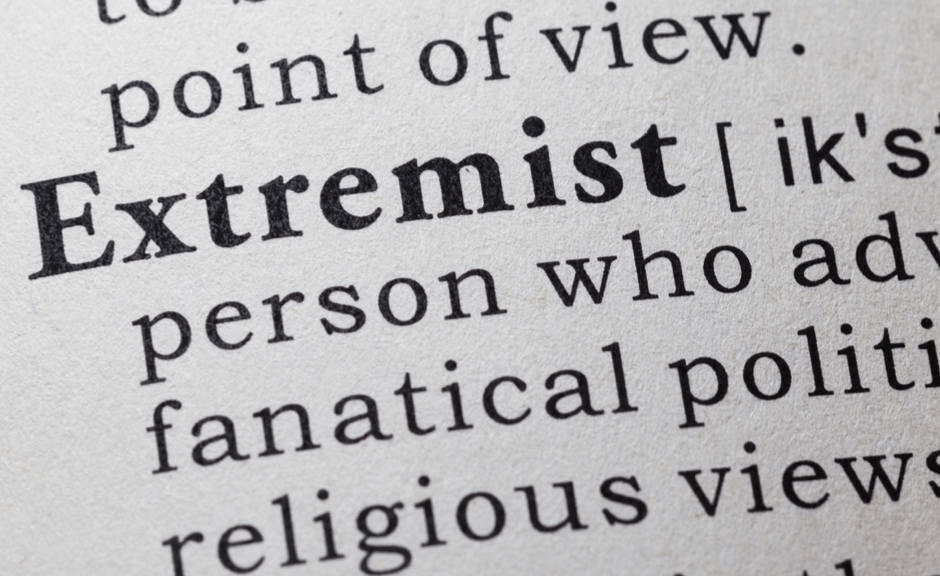
Not My Mark Driscoll? The Threat of Dismissing Extreme Christianity
Mark Driscoll, the toxic masculinist megachurch pastor who was defrocked a couple of years ago, yet has formed a new megachurch in Arizona, is in the news again this week. This time it’s for reports of increasingly cult-like behavior in his church, including excommunicating and surveilling a family whose brown-skinned son kissed Driscoll’s 15 year old daughter (more details can be found here about the incidents). When I heard about this incident, my first impulse, I’ll confess, was to dismiss it—especially since Driscoll’s extreme 2014 comments about women being “penis homes” were being recirculated alongside it, and I was feeling understandably revolted by the whole thing. And yet, having lived through the last four years of political history in the US, up to and including the events of January 6, I knew wholesale dismissal would be unwise. In the rest of this article I’ll unwrap how all of that works, and offer some suggestions for steps we can take to address the continuing threats of extreme right-wing Christianity in today’s religio-political landscape.
This one is going to take a few minutes to unwrap, but I hope you’ll find it worth it—thanks for hanging in there with me.
Some Context on My Standpoint
Okay, so Mark Driscoll. He’s not a voice I grew up with—like Joshua Harris, who was until recently the authorial voice of extreme purity culture, Driscoll started his big stuff after I was already in my undergrad college education. By the time I heard his name around, I was pretty firmly entrenched into somewhat more moderate ways of thinking and doing things, and presumed myself fairly “safe” from what I deemed his more extreme ideas. In fact, though, let’s be honest—I just ignored him because I was busy with other things.
In some ways, this was very healthy—by not diving into these ideas and letting them influence me, I remained healthier than others who did. And yet, as I’ll explain, I still didn’t know enough at the time to understand why I might need to take them seriously. Stick with me—I’ll get there.
The Influence of “Christian Bothsidesism” on My Views Back Then
As I’ve described before, I grew up with what I’ve been calling Christian (Protestant) bothsidesism, and at this point in my life was pretty entrenched in dismissing voices that I didn’t see as representing true Christianity—which in my tradition’s view usually (and not actually rationally) involved equally seeing voices from both the right and the left as always equally scary and wrong. (Sigh.)
Like Joshua Harris’s extreme messages about neither “dating” nor kissing before marriage, Driscoll’s style, what little I knew of it, seemed pretty foreign to my way of living faith—and so I dismissed it.
There for the Grace of God…
And let’s be clear—since Driscoll was part of the “emerging church,” which was new and shiny in the late ’90s and early 2000s, there wasn’t anything all that morally superior about me dismissing his way of doing things. I just happened to be getting interested in liturgical expressions of Christianity at the time, and that, together with my highly sensitive personality, was drawing me away from megachurches and their loud music and what I saw as overly simplified “seeker sensitive” messaging that didn’t have the nuance I was looking for.
Ah, The Toxic Sides of “Nice”
As a person trained in Christian Nice (look at my series starting here for why that would have been a problem), I usually wouldn’t say this to people who were fans of either, mind you—not at that time. And Driscoll specifically wasn’t really on my radar at that time.
I saw it as a form of “open-mindedness” that I wouldn’t critique things in front of the people who liked them—when really, it was way more of a people-pleasing type thing. I mean, there were some natural impulses that kept me there for good reason, and that position DID allow me to listen enough to understand what was really going on there, which is still helpful—but that doesn’t mean it was a great thing overall that I never voiced my dissent with the people who embraced these things.
But, You Know, I Would Critique Behind Their Backs…
But if I were talking to Christians in my category, or especially someone who didn’t identify as Christian, I was quick to “Not my Joshua Harris” and “not my televangelists” and “not my megachurches” and “not my prosperity gospel” my way of living faith. And if I’d known more about Driscoll, I likely would have added him specifically as well.
Looking back, I’m thankful for my deep discomfort and willingness to critique these things, at least with some people I found safe spaces for doing so—and yet I can simultaneously see that there was an unhealthy defensiveness in the fact that I did so and how.
I Was Too Quickly Dismissing My Part in Solving These Problems
See, as I look at my “not my televangelist” type statements, I see them as very similar to the “not all white people” or “not all men” defensive responses that often rightfully gain such ire in today’s challenging conversations.
After all, if someone is leveling a critique at a group of people, this kind of response is too often the deft ninja-kick way to evade seeing whether the critique might at all apply to you and to try to keep yourself on the “pure” side of things—while unfortunately drawing rightful attention from the critiques.
And, most importantly, I was living in a sort of fallacy of helplessness about those folks—I know now that came from having absorbed the lies that my voice and actions surely couldn’t do anything against these problems. That fallacy of helplessness is quite the kicker.
I Can See a Bit More Clearly Now…
And looking back with the “hindsight is 20/20” view of how my “moderate” denomination and its bothsidesism has fared in today’s divisive political climate (too often functioning to shore up right-wing authoritarianism and fascistic rhetoric and policies), it’s easy to see how I—and others of my people—used these kinds of defense mechanisms to avoid seeing the ways we were guilty of some of the same things we sought to separate ourselves from by trying to claim that we were in SUCH a different category as those we considered more extreme than ourselves.
Let’s Talk about Purity Culture, Then
Take Joshua Harris and extreme purity culture, which is very much connected to the Driscoll case in light of the kerfuffle about his fifteen-year-old daughter kissing someone.
Like I said, I got in under the wire ahead of the I Kissed Dating Goodbye trend (which has now been disclaimed by Joshua Harris, who has since apologized, discontinued the printing of the book, and left the faith).
Spoiler: Purity Culture Lite Had Issues Too
Instead, I grew up in what I call Purity Culture Lite, which was fine with kissing but still created such a weird culture around relationships that the guys at my moderate college were scared to start dating someone because the assumption was still there, under the surface, that dating would automatically lead to marriage.
This strange culture created all sorts of unintentional problems, the biggest among them the idea that once you started dating someone you shouldn’t be looking for or screening for unhealthy relational patterns that could lead to issues later on. The discomfort about dating that came with these assumptions led to a kind of scarcity environment where people assumed they needed to be looking for a partner so much that they weren’t adequately concerned about what type of partner.
Not as Extreme But Still Damaging
Now, as I’ve said, this culture wasn’t as extreme as some of those in more extreme purity culture environments, but it still led to unhealthy expectations for romantic relationships. Part of these expectations surrounded the idea of breakups and divorce—as I described in one of the first posts I made on this site, I absorbed some really unhealthy attitudes around divorce that really hurt me by the time I actually needed to get one for good reasons.
So yeah. I mean, I’m super thankful for evading the kind of extreme authoritarian cultish church response like this if I had kissed someone. Protestants are sort of known for having a lot of different churches because of this strong “flight” stress response to separate ourselves out from toxicity, and this is in many ways a great thing.
Many Ironies Involved in Thinking We Had Purified Ourselves from Purity Culture
The problem, of course, is that in separating ourselves out, we weren’t guaranteed to be somehow ironically “pure” from the damage purity culture impulses can bring in some way, any more than abstaining from kissing or disdaining divorce leads toward healthy relationships.
See, we had—granted milder—but some of the same problems that these more extreme forms of Christianity had, and too quickly declaring our church was different was, I see now, in a lot of ways, the equivalent of saying we hadn’t kissed these extreme Christians, all the while we had been absorbing and exhibiting some of the same toxic theologies and group dynamics in smaller portion sizes that they had.
Deeper Soul Searching and Shifts Would Have Been Wiser
We would have been better off doing some deep soul searching and acknowledging and working to remove those unhealthy things. That would have made our “not my extreme Christianity” claims MUCH more consistent and honest.
Again, Hindsight is 20/20
Again, I acknowledge this kind of thing is soooo much easier for me to see since the 2016 election swooped in and apocalyptically made clear how split my own childhood church would become over this kind of thing. It’s so much easier to see this stuff clearly after an apocalypse (as a reminder, the Greek word for apocalypse means “to make clear”).
It is also much easier to see since I fought my own bothsidesism enough to properly hear and absorb the rightful critiques that progressives have been making about this kind of thing for much longer than I was willing to acknowledge their truth.
How Bothsidesism Blocked Me From Moving Ahead Faster
After all, the other side of what I and my people had absorbed from the theological and political right was a decrying of more progressive voices. The more that unhealthy socialization had blocked me from hearing critiques of this sort of thing, the more likely it was that I was to learn how to think critically about the problems of the issues we shared with more conservative figures.
Progressive Christians Aren’t Always Immune Either
Of course, now that I’ve jumped the fence to the more progressive side of things, and with the examples of January 6 and other extreme events fully in mind, I can see that progressives sometimes have had another subtler but similar in effect version of the “not my Mark Driscoll” issue going on.
The issue in a lot of progressive circles is that those who are comfortable there are often, like those I grew up with, critiquing conservative Christianity from a safe distance without assuming that it should have any effect on them. Which is extra-challenging because most mainline and progressive Christian churches are actually religio-politically purple in many ways, and the big tent churches are even more so, and not always willing to disclaim the extreme right-wing Christian messaging that too often filters through.
More People Are Thankfully Starting to Grasp the Problem—So Let’s Work Together
Now, Since January 6 came around, and important books like Jesus and John Wayne (which I’ve previously talked about here and here) are connecting all the dots for people, and other exvangelicals and voices of dissent are assertively speaking out, people are starting to realize that simply “not my Mark Driscolling” both theologies and politicians that seem like edge-case cranks is an extremely unwise option.
I am encouraged by this. It is important that we remember that the fight toward healthy spiritualities involves both strong self-examination and improvement AND continuing to stand up against the unhealthy spiritualities wherever we find them. It also involves working together in a relay marathon toward healthier outcomes for the common good.
Like Bad Weeds, the Mark Driscolls of the World
See, here’s the thing: even when they’re defrocked (as Mark Driscoll was a few years back), people who supported him continued to platform him, and like a weed, he sprang up again with less oversight in a more malignant form. Even if he has less influence now in some ways, he still has much too much influence, as last week’s story shows.
It’s not that Mark Driscoll shouldn’t have been defrocked—I believe he absolutely should have been. But he illustrates that we can’t just ignore right-wing extremists of any type, assuming the problem has gone away, even when he was held accountable in a particular venue. And we shouldn’t assume that their toxicities are only theirs and not, in some moderated form, also our own.
Disturbing Similarities to Waco
While Mark Driscoll’s church isn’t quite as extreme or seemingly outwardly violent as David Koresh was at Waco, we need to similarly keep an eye on him and continue to speak up against his kind of toxic crap.
And after all, if you read the biography of David Cooper, the influential right-wing conspiracy theorist who popularized the term sheeple—I talked about him and that bio in in a series last summer starting here—you’ll see that it was the movement he considered himself a part of, the Patriot Movement, that ultimately led to the mainstreaming of QAnon conspiracy theories and ultimately the events of January 6.
Not Really an Anomaly, Sadly—and This Movement Continues to Have Way Too Much Power
And as books like Jesus and John Wayne make clear, the militant masculinity expressed in the extreme kinds of purity culture that people like Mark Driscoll are still using to drive their actions are no more extreme than those found generally in white Evangelicalism generally, and greatly explain why white Evangelicals often find themselves on the side that created January 6—a movement that too many politicians are still supporting and blocking healthier forms of government that are reaching toward the common good.
So what then should we do in response to the Mark Driscolls of the world?
Don’t get me wrong—these are not easy problems to solve. There are no silver bullet solutions, as usual. But here are a few important actions we can take, doing whatever we can:
- Keep assertively working against extreme right-wing voices toward a healthier world (and remember that if you think they’re not affecting you, that people are being hurt by them, both locally and nationally).
- If you’re not in a place where these voices have traumatized you, great! Use your health and energy to listen to the voices of those who have experienced hurt by these kinds of voices and take them seriously.
- Look for ways that the extremes help us see the moderated forms of problems we may share with them, and work against those problems wherever you may find them.
- Creatively work to form healthier communities, theologies and political philosophies and advocate and work toward them wholeheartedly.
- Remember that this work is hard, and can be damaging, and is a relay race. Stop to rest and heal as you need to—and when you can, pick up the baton and keep going.
I’m sure there’s more, but that’s all I’ve got today.
A Final Charge
Go team #AssertiveSpirituality! Let’s continue to do what we can where we are with what we’ve got to speak up against the toxic crap toward a healthier world for us all. We can do this thing.
Looking for more resources toward speaking up for what’s right and dealing with the conflict that results?
Boy, do we have got a free “Assertive Spirituality Guide to Online Trolls” for you. It actually helps you with conflict both online and off. To get it, sign up for our email newsletter (either in the top bar or by checking the appropriate box when commenting on this article). Once you’ve confirmed your email address, we’ll send you the link to the guide in your final welcome email. You can unsubscribe at any time, but we hope you’ll stick around for our weekly email updates. As soon as we feasibly can we’re hoping to offer more online courses and other support resources for those advocating for the common good, and if you stay subscribed, you’ll be the first to know about these types of things when they pop up.

